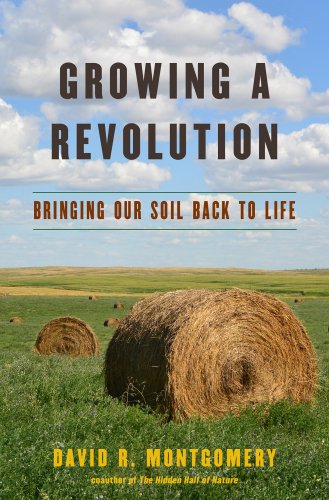
Growing a Revolution
Bringing Our Soil Back to Life
کتاب های مرتبط
- اطلاعات
- نقد و بررسی
- دیدگاه کاربران
نقد و بررسی

March 1, 2017
An optimistic look at how regenerative farming can revive the world's soil, increasing food production, boosting cost effectiveness, and slowing climate change.For decades, big agribusiness has promoted quick-and-dirty farming practices that have profoundly worsened the health of the planet's agricultural land, a cycle enabled by the use of herbicides and pesticides. As a result, farmers across the world are seeing their efforts yield smaller crops and falling profits--never mind the environmental impact. Yet an often cited myth is that industrialized agriculture is the only option to keep up with a rapidly growing population. MacArthur Fellow Montgomery (Geomorphology/Univ. of Washington; The Rocks Don't Lie: A Geologist Investigates Noah's Flood, 2012, etc.) combines decades of rigorous scientific research and firsthand experience to demonstrate that a common-sense, biology-based approach to maintaining soil health is key to reversing degradation. Importantly, the author emphasizes that such regeneration is not only possible, it's within reach for farms of any size and in any climate. In a compelling writing style that is more conversational than scientific, Montgomery recounts trips around the globe where he met the pioneering farmers embracing the soil health movement. Through their successes, the author elegantly connects the dots among no-till planting, the use of cover crops, letting cows graze, and other practices that have shown almost universal success in allowing farmers to dramatically increase crop yields and lessen the need for chemical additives. These practices also reduce the amount of carbon in our atmosphere. A wide-scale move toward regenerating soil health would truly revolutionize what we eat and who has access to it, and while nothing can happen overnight--especially when government subsidies reward farming practices supporting the status quo--the author is confident that change is afoot and that the future will be bright and green.Montgomery's fascinating expose of how our food is grown will convince readers that soil health should not remain an under-the-radar issue and that we all benefit from embracing a new philosophy of farming.
COPYRIGHT(2017) Kirkus Reviews, ALL RIGHTS RESERVED.

April 1, 2017
Montgomery (geomorphology, Univ. of Washington; Dirt: The Erosion of Civilizations) illustrates how following the three principles of conservation agriculture can prevent soil erosion, create fertile soil in a short period of time, keep soil cooler and moister, minimize pests and diseases, and save farmers money and time through using less fossil fuel and fewer insecticides and herbicides. Conservation agriculture is a "no till" or "low till" method, in which farmers grow cover crops and leave the crop residues on the field while using a sophisticated crop rotation system. Interviewing a wide range of scientists and farmers (those living or working in the Dakotas, Ghana, and Costa Rica, as well as at the organic farm at the Rodale Institute in Pennsylvania), Montgomery shares their results, from research plots to actual farms. His findings demonstrate that after several years, farmers practicing conservation agriculture achieve the same or better results than those employing conventional techniques, especially during times of drought. He also investigates how livestock manure can fertilize the soil and how biochar can be an important soil amendment. VERDICT This fascinating, accessible, well-researched work will be of interest to all who are concerned with feeding the world's burgeoning population while protecting the soil and, ultimately, the environment.--Sue O'Brien, Downers Grove P.L., IL
Copyright 2017 Library Journal, LLC Used with permission.

May 15, 2017
This surprising, inspiring, and thoroughly engaging look at soil restoration is an outstanding example of how a complicated, even seemingly dull topic can take flight in the hands of an enthusiastic and knowledgeable author. Montgomery (The Hidden Half of Nature, 2015) is a professor of geomorphology and a strong proponent of ditching the plow and other innovative methods to re-enrich soil. Well aware that his message can be easily dismissed by those supporting traditional methods, he has carved out a following through his articles and speeches that reveal the costly and detrimental relationship between current soil maintenance practices and the big business of fertilizer (which is dominated by Koch Industries and a Cargill spinoff). Montgomery's solutions save money, are less reliant on pesticides and other chemicals, and involve technological advancements. The battle, he declares, is not between organic and conventional but rather against those in the fertilizer industry who have fostered a false dependence. Relevant to farmers, backyard gardeners, and everyone who cares about our future, this is a clarion call that should not be ignored. Rural libraries take special note.(Reprinted with permission of Booklist, copyright 2017, American Library Association.)

























دیدگاه کاربران